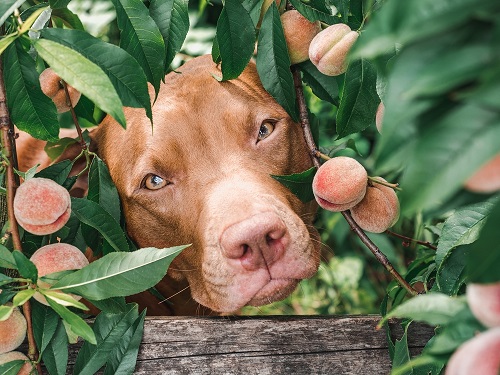Can Dogs Eat Peaches? Can it be a good fruit snack for them? Let’s have a look at how to feed it in the right way!
Are fruits safe and beneficial for your four-legged friend? Can Dogs Eat Peaches? Time to end the confusion and get the answers!
What is a Peach?

A peach is a fruit that comes from the Prunus persica tree, which is native to China and belongs to the Rosaceae family. It has fuzzy skin that can be yellow, orange, or red and juicy, sweet flesh with a large pit in the center.
Peaches are commonly eaten fresh, but they can also be canned, dried, or used in various recipes such as pies, jams, and smoothies.
Can Dogs Eat Peaches?
So, Can Dogs Eat Peaches? Yes, dogs can eat peaches safely, as long as they are given in moderation and the necessary precautions are taken. The flesh of the peach is not toxic to dogs, and it can even provide some nutritional benefits.
However, you should never let your dog eat the pit or the stem of the peach, as they can cause serious digestive issues, choking hazards, and even blockages.
Read here about Can Dogs Eat Guava | Is Guava Safe For Dogs
Health Benefits of Peaches
- Vitamins and minerals: Peaches are a good source of vitamins A and C, as well as potassium and fiber. These nutrients can support a dog’s immune system, vision, and digestion.
- Antioxidants: Peaches contain antioxidants such as beta-carotene and lutein, which can help protect cells from damage caused by free radicals.
- Hydration: Peaches have a high water content, which can help keep your dog hydrated and prevent constipation.
- Low in fat and calories: Peaches are low in fat and calories, making them a healthy snack option for dogs who are watching their weight.
A Few Health Concerns

- The pit: The pit of a peach contains cyanide, which is toxic to dogs and can cause serious digestive issues if ingested. Always remove the pit before giving your dog a peach.
- Digestive upset: Peaches are high in sugar and can cause digestive upset such as diarrhea or vomiting if given in excess or if your dog has a sensitive stomach.
- Allergies: Some dogs may be allergic to peaches, which can cause symptoms such as itching, redness, or swelling. If your dog has never eaten peaches before, start with a small amount and monitor them closely for any signs of an allergic reaction.
- Pesticides: Peaches are often treated with pesticides, which can be harmful to dogs if ingested. Always wash the peach thoroughly and consider buying organic peaches to minimize exposure to pesticides.
Read here about Can Dogs Eat Biscuits | Are Biscuits Safe for Dogs?
How to Safely Give Your Dog Peaches?
- Always remove the pit and stem before giving your dog a peach. The pit can be a choking hazard, and it contains cyanide, which is toxic to dogs.
- Wash the peach thoroughly to remove any pesticides or other harmful chemicals before giving it to your dog.
- Cut the peach into small pieces and give it to your dog as a treat. This will make it easier for your dog to digest and help prevent choking.
- Start with a small amount to see how your dog reacts to the peach. If your dog has never eaten peaches before, it’s best to start with a small piece and monitor them closely for any signs of digestive upset or allergic reactions.
- Limit the amount of peach you give your dog. While peaches can provide some health benefits, they are high in sugar and should be given in moderation as part of a well-balanced diet.
- Consider other fruits that are safe for dogs. If your dog doesn’t like peaches or if you’re concerned about the potential health risks, consider other fruits such as blueberries, apples, or watermelon, which are also safe and healthy for dogs in moderation.
How Many Peaches Can Dogs Eat?
While peaches can offer some health benefits to dogs, they should be given in moderation as part of a well-balanced diet. The number of peaches your dog can eat will depend on their size, weight, and overall health. As a general rule, it’s best to limit the amount of peach you give your dog to a few small pieces at a time.
It’s also important to keep in mind that peaches are high in sugar, so they should not be given too frequently or in large amounts. If you notice any signs of digestive upset such as diarrhea or vomiting, it’s best to stop giving your dog peaches and consult with your veterinarian.
Read here about Can Dogs Have Xylitol Poisoning?
Dog Safe Peach Recipe

If you want to incorporate peaches into your dog’s diet in a fun and safe way, here is a simple dog-safe peach recipe:
Ingredients:
- 2 ripe peaches, pitted and chopped
- 1 cup plain, unsweetened yogurt
- 1 tablespoon honey (optional)
Instructions:
- In a blender or food processor, puree the chopped peaches until smooth.
- In a medium bowl, mix the peach puree with the yogurt and honey (if using) until well combined.
- Pour the mixture into ice cube trays or silicone molds and freeze for several hours or overnight until firm.
- Once the treats are frozen, pop them out of the molds and store them in an airtight container in the freezer until ready to serve.
- These frozen peach dog treats are a delicious and healthy way to treat your dog to the sweet taste of peaches. Just be sure to give them in moderation and monitor your dog for any signs of digestive upset.
Can Dogs Eat Peach Yogurt?
Peach yogurt is typically flavored with peach syrup or juice, which can contain added sugars and other ingredients that are not healthy for dogs. If you want to give your dog the taste of peach, it’s safer to give them fresh, ripe peaches or a homemade peach dog treat made with plain yogurt and fresh peaches.
Read her about Can Dogs Eat Strawberry | Are Strawberries Safe For Dogs
Can Dogs Eat Frozen Peaches?
Store-bought frozen peaches may contain added sugar and preservatives, which are not healthy for dogs. Additionally, the frozen chunks may be too large and pose a choking hazard to your pet.
Can Dogs Have Dehydrated Peaches?
Yes, dogs can have dehydrated peaches, but it’s important to give them in moderation as they are high in natural sugars.
Quick Takeaways
So, Can Dogs Eat Peaches? Dogs can safely consume dehydrated peaches in moderation. These treats can be a tasty and healthy addition to your dog’s diet, as they are a good source of vitamins, fiber, and antioxidants. .
